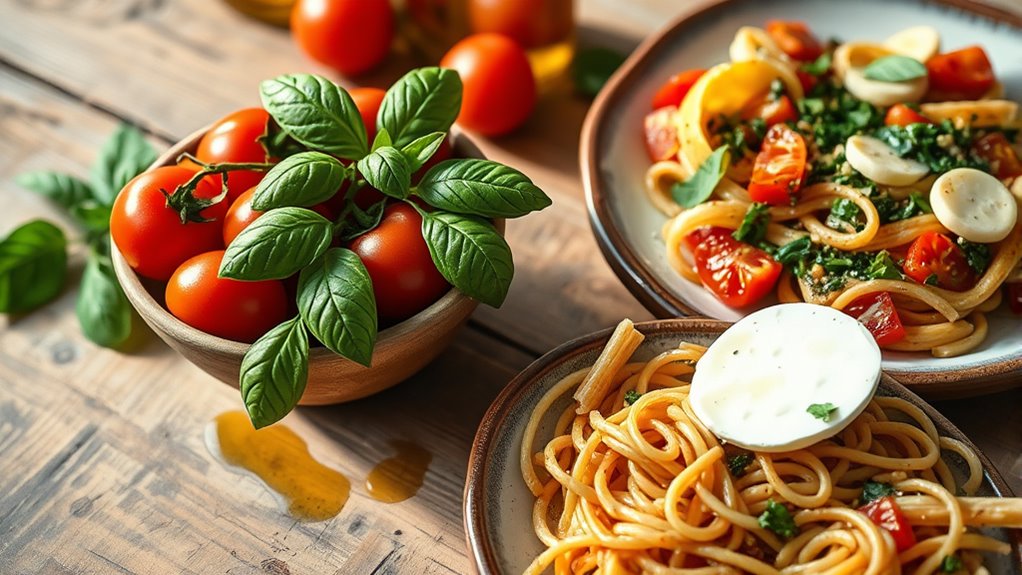Italian cuisine demonstrates how food acts as medicine by emphasizing fresh, nutrient-rich ingredients, abundant herbs, and high-quality olive oil. These elements support healthy aging by reducing inflammation, lowering cholesterol, and boosting immune function. Incorporating Mediterranean herbs like basil and oregano, along with olive oil, enhances flavor and health benefits. Consuming these foods regularly can help prevent chronic diseases and promote longevity. Keep exploring how these simple, delicious ingredients work together to keep you healthier longer.
Key Takeaways
- Italian cuisine emphasizes fresh, nutrient-rich ingredients that promote heart health and reduce inflammation, supporting healthy aging.
- Incorporating Mediterranean herbs like basil, oregano, and rosemary offers antioxidants and anti-inflammatory benefits.
- Extra virgin olive oil provides monounsaturated fats and polyphenols that protect against cellular damage and support brain health.
- Combining olive oil with herbs enhances nutrient absorption and boosts overall antioxidant intake for longevity.
- The Mediterranean diet’s focus on flavor and nutrition encourages sustainable, health-promoting eating habits over time.

Food isn’t just fuel; it’s a powerful tool for preventing and managing health conditions. When you embrace the principles of Italian cuisine, especially the use of Mediterranean herbs and olive oil benefits, you’re actively supporting healthy aging. Italian dishes are rich in flavors derived from fresh ingredients, and they promote heart health, reduce inflammation, and boost longevity.
Mediterranean herbs like basil, oregano, rosemary, and thyme aren’t just for flavor—they’re packed with antioxidants and anti-inflammatory compounds. Incorporating these herbs into your meals can help lower blood pressure, improve digestion, and fight oxidative stress. For example, basil contains essential oils that support immune function, while oregano offers antibacterial properties. When you season your dishes with these herbs, you’re adding more than taste; you’re infusing your body with health-boosting nutrients that can slow the aging process and enhance your overall well-being.
Olive oil benefits are another cornerstone of Italian cuisine that contribute profoundly to healthy aging. Rich in monounsaturated fats, olive oil helps lower bad cholesterol levels and protect your heart. Its high content of polyphenols and antioxidants combats free radicals, reducing cellular damage and inflammation. Regularly substituting processed fats with extra virgin olive oil can make a noticeable difference in your cardiovascular health and cognitive function. When you cook with olive oil or drizzle it over salads, you’re not only elevating flavor but also nourishing your body with a potent source of health-promoting compounds. These benefits are particularly essential as you age, helping to maintain brain health, prevent chronic diseases, and support joint mobility.
Olive oil’s antioxidants support heart, brain, and joint health as we age.
Pairing olive oil with Mediterranean herbs amplifies their health effects. For example, a simple dressing of extra virgin olive oil combined with fresh basil and oregano makes a delicious, healthful addition to your meals. This combination is easy to prepare, versatile, and packed with nutrients that promote longevity. The Mediterranean diet’s emphasis on these ingredients encourages a balanced, nutrient-dense approach to eating, which is indispensable for aging gracefully.
Frequently Asked Questions
How Does Italian Olive Oil Benefit Aging Health?
You benefit from Italian olive oil because it’s rich in antioxidants that protect your cells from damage. These antioxidants help reduce inflammation and support your aging cardiovascular system. When you include olive oil in your diet, you promote healthier blood flow and lower your risk of heart issues. Its healthy fats and protective compounds make it a smart choice for maintaining your overall health as you age.
Are Traditional Italian Herbs Anti-Inflammatory?
Yes, traditional Italian herbs like rosemary, thyme, and oregano have medicinal properties with anti-inflammatory benefits. You can incorporate these herbs into your meals to help reduce inflammation and support your overall health. Their natural compounds fight oxidative stress and may lower the risk of chronic diseases linked to aging. Using these herbs regularly in your cooking lets you enjoy their flavorful and health-boosting effects simultaneously.
Can Italian Cheese Consumption Support Bone Health?
Yes, Italian cheese consumption can support your bone health. Cheese is rich in calcium, which is essential for maintaining strong bones and improving bone density. Regularly including cheeses like Parmesan or Ricotta in your diet helps provide the calcium needed to prevent osteoporosis and fractures. So, savoring these cheeses not only enhances flavor but also contributes to your overall bone strength and healthy aging.
What Role Do Pasta Varieties Play in Nutrition?
Think of pasta varieties as the colorful palette of your nutrition masterpiece. Choosing whole grain options boosts your fiber content, helping digestion and keeping you full longer. Whole grain pasta provides essential nutrients and complex carbs that fuel your body steadily. By selecting different shapes and types, you diversify your diet, supporting healthy aging with each bite. So, embrace the variety—your body will thank you for the nourishing, fiber-rich choices.
How Do Italian Desserts Fit Into a Healthy Diet?
Italian desserts can fit into a healthy diet when you practice moderation and portion control. Keep an eye on sugar content, choosing smaller servings or opting for fruit-based options like fresh berries or poached fruits. By enjoying desserts in moderation and controlling portions, you satisfy your sweet tooth without compromising your nutrition goals. This balanced approach allows you to indulge occasionally while maintaining overall health and wellness.
Conclusion
You might think enjoying delicious Italian food conflicts with healthy aging, but that’s not true. Italian cuisine, rich in fresh vegetables, healthy fats, and whole grains, actually supports your health. It’s all about choosing quality ingredients and mindful portions. So, don’t dismiss Italian dishes—embrace them as part of a balanced, nutritious lifestyle that keeps you vibrant and strong long into your years. Food truly is medicine when you make smart, flavorful choices.









